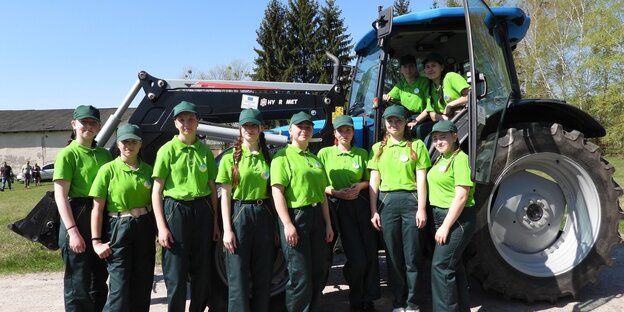Thousands of Ukrainians are on the front lines and missing from civilian life. That is why there are now more women working in what were previously “men's jobs.”

Young women from Kolki, western Ukraine, receive training to become tractor drivers Photo: Yuri Konkevich
LUTZ taz | History repeats itself: as in the post-World War II period, women in Ukraine are learning professions that were generally considered “masculine”: they become construction workers, energy engineers or bus drivers. Men who worked in the countryside before Russia's war of aggression against Ukraine began in 2022 are mostly working in the Ukrainian armed forces as drivers or mechanics of tanks and infantry fighting vehicles. There they are now worth their weight in gold. Therefore, as the mobilization continues, women must get behind the wheel of tractors and combines.
“We young women will replace the men, no matter what you think.”
In the western Ukrainian town of Kolki (Volhynia region), 50 girls and women are receiving training in using tractors because their husbands or fathers have been drafted into military service, but at home they have equipment and land that they They need to be cultivated. Julia Nevidjuk can also be found at the local vocational training center. She is 16 years old and is in her second year of learning to drive a tractor. She says it's a childhood dream.
“Now, in times of war, children are mobilized. There is no one to sow in spring and the harvest is harvested in autumn. We young women will replace men, whatever you think,” says Julia.
Who if not her?
Darya, a second-year apprentice, wanted to be a seamstress. But with the start of the war she changed her mind. “Sometimes they ask me: Why did you choose that? Maybe you should have been a chef. That suits a young woman better than being a tractor driver. But who, if not us women, has to intervene now? My family supported me a lot. I will be here to work our land and grow grains for bread,” says Darya.
Sometimes the daughters of recruits come to learn how to drive a tractor and replace their parents.
“Girls learn more easily,” says Yuri Matwitschuk, the teacher's right-hand man. He recalls that in Soviet times women were prohibited from training as tractor drivers due to dangerous working conditions. It was said that strong vibrations would have harmful effects on the female body. But the technology and requirements have changed since then.
Vocational training for all age groups.
The Kolki vocational training center has 36 tractors and a training area. Practical lessons take place here. Every year, similar institutions in the region train up to 800 specialists. But the need for people in this profession is constantly growing, since Volhynia is an agricultural region.
The center's director, Lyudmila Panasiuk, is also a qualified tractor operator. She says that not only girls come after school to learn men's jobs, but also older women whose husbands are now at war.
“Many farmers in my region are already at war: 300 people from 13 villages. “These are farm owners and their workers,” says Ruslan Jomych, president of the Volyn Region Farmers' Association.
This is reminiscent of the so-called widow's plow, an ancient tradition in Ukraine, according to which in spring townspeople helped women waiting for their husbands from the army to cultivate their fields. Or widows who had lost their husbands in the war.
Lack of men in agriculture, construction and industry
Due to the mobilization of men, there is a shortage of personnel not only in the agricultural sector, but also in construction and industry, says Evgenia Kutsenkova, editor of the employment portal. Work.ua, in an interview with league. In this government information portal you can find statistical data on various areas.
It is very difficult for an entrepreneur to find welders, mechanics, electricians or electrical and gas conductors. For this reason, employers are increasingly hiring women in positions that were previously atypical for them, including underground jobs or as electricians. To overcome the shortage of qualified workers, companies invest in the retraining of women, but the State also participates in financing training.
Previously, in Ukraine there were about 450 professions in which women were not allowed to work due to difficult and harmful working conditions, especially in metallurgy, construction and railway transport. Since 2017, gender segregation in professions has been abolished in Ukraine, but stereotypes about purely “female” and “male” professions persist.
The war gradually dismantles these stereotypes. The Minister of Economy, Yulia Sviridenko, stated that from 2023 more and more women work in industry, construction and mining. She predicts that the majority of women in Ukraine after the war will work in the energy sector, transportation and weapons production.
From Russian Barbara Oertel
